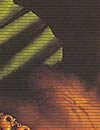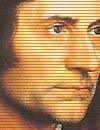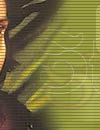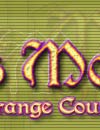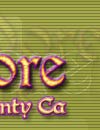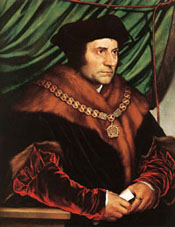 St. Thomas More:
St. Thomas More:
Saint, knight, Lord Chancellor of England, author and martyr, born in London, 7 February, 1477-78; executed at Tower Hill, 6 July, 1535.
|
This biography is taken from the Catholic Encyclopedia
He was the sole surviving son of Sir John More, barrister and later judge, by his first wife Agnes, daughter of Thomas Graunger. While still a child Thomas was sent to St. Anthony's School in Threadneedle Street, kept by Nicholas Holt, and when thirteen years old was placed in the household of Cardinal Morton, Archbishop of Canterbury, and Lord Chancellor. Here his merry character and brilliant intellect attracted the notice of the archbishop, who sent him to Oxford, where he entered at Canterbury Hall (subsequently absorbed by Christ Church) about 1492. His father made him an allowance barely sufficient to supply the necessaries of life and, in consequence, he had no opportunity to indulge in "vain or hurtful amusements" to the detriment of his studies.
At Oxford he made friends with William Grocyn and Thomas Linacre, the latter becoming his first instructor in Greek. Without ever becoming an exact scholar he mastered Greek "by an instinct of genius" as witnessed by Pace (De fructu qui ex doctrina percipitur, 1517), who adds "his eloquence is incomparable and twofold, for he speaks with the same facility in Latin as in his own language". Besides the classics he studied French, history, and mathematics, and also learned to play the flute and the viol. After two years' residence at Oxford, More was recalled to London and entered as a law student at New Inn about 1494. In February, 1496, he was admitted to Lincoln's Inn as a student, and in due course was called to the outer bar and subsequently made a bencher. His great abilities now began to attract attention and the governors of Lincoln's Inn appointed him "reader" or lecturer on law at Furnival's Inn, his lectures being esteemed so highly that the appointment was renewed for three successive years.
It is clear however that law did not absorb all More's energies, for much of his time was given to letters. He wrote poetry, both Latin and English, a considerable amount of which has been preserved and is of good quality, though not particularly striking, and he was especially devoted to the works of Pico della Mirandola, of whose life he published an English translation some years later. He cultivated the acquaintance of scholars and learned men and, through his former tutors, Grocyn and Linacre, who were now living in London, he made friends with Colet, Dean of St. Paul's, and William Lilly, both renowned scholars. Colet became More's confessor and Lilly vied with him in translating epigrams from the Greek Anthology into Latin, then joint productions being published in 1518 (Progymnasnata T. More et Gul. Liliisodalium).
In 1497 More was introduced to Erasmus, probably at the house of Lord Mountjoy, the great scholar's pupil and patron. The friendship at once became intimate, and later on Erasmus paid several long visits at More's Chelsea house, and the two friends corresponded regularly until death separated them. Besides law and the Classics More read the Fathers with care, and he delivered, in the Church of St. Lawrence Jewry, a series of lectures on St. Augustine's De civitate Dei, which were attended by many learned men, among whom Grocyn, the rector of the church, is expressly mentioned. For such an audience the lectures must have been prepared with great care, but unhappily not a fragment of them has survived. These lectures were given somewhere between 1499 and 1503, a period during which More's mind was occupied almost wholly with religion and the question of his own vocation for the priesthood.
This portion of his life has caused much misunderstanding among his various biographers. It is certain that he went to live near the London Charterhouse and often joined in the spiritual exercises of the monks there. He wore "a sharp shirt of hair next his skin, which he never left off wholly" (Cresacre More), and gave himself up to a life of prayer and penance. His mind wavered for some time between joining the Carthusians or the Observant Franciscans, both of which orders observed the religious life with extreme strictness and fervour. In the end, apparently with the approval of Colet, he abandoned the hope of becoming a priest or religious, his decision being due to a mistrust of his powers of perseverance. Erasmus, his intimate friend and confidant, writes on this matter as follows (Epp. 447):
"Meanwhile he applied his whole mind to exercises of piety, looking to and pondering on the priesthood in vigils, fasts and prayers and similar austerities. In which matter he proved himself far more prudent than most candidates who thrust themselves rashly into that arduous profession without any previous trial of their powers. The one thing that prevented him from giving himself to that kind of life was that he could not shake off the desire of the married state. He chose, therefore, to be a chaste husband rather than an impure priest."
The last sentence of this passage has led certain writers, notably Mr. Seebohm and Lord Campbell, to expatiate at great length on the supposed corruption of the religious orders at this date, which, they declare, disgusted More so much that he abandoned his wish to enter religion on that account. Father Bridgett deals with this question at considerable length (Life and Writings of Sir Thomas More, pp. 23-36), but it is enough to say that this view has now been abandoned even by non-Catholic writers, as witness Mr. W.H. Hutton:
It is absurd to assert that More was disgusted with monastic corruption, that he 'loathed monks as a disgrace to the Church'. He was throughout his life a warm friend of the religious orders, and a devoted admirer of the monastic ideal. He condemmned the vices of individuals; he said, as his great-grandson says, 'that at that time religious men in England had somewhat degenerated from their ancient strictness and fervour of spirit'; but there is not the slightest sign that his decision to decline the monastic life was due in the smallest degree to a distrust of the system or a distaste for the theology of the Church.
The question of religious vocation being disposed of, More threw himself into his work at the Bar and scored immediate success. In 1501 he was elected a member of Parliament, but as the returns are missing his constituency is unknown. Here he immediately began to oppose the large and unjust exactions of money which King Henry VII was making from his subjects through the agency of Empson and Dudley, the latter being Speaker of the House of Commons. In this Parliament Henry demanded a grant of three-fifteenths, about 113,000 pounds, but thanks to More's protests the Commons reduced the sum to 30,000.
Some years later Dudley told More that his boldness would have cost him his head but for the fact that he had not attacked the king in person. Even as it was Henry was so enraged with More that he "devised a causeless quarrel against his father, keeping him in the Tower till he had made him pay a hundred pounds fine" (Roper). Meanwhile More had made friends with one "Maister John Colte, a gentleman" of Newhall, Essex, whose oldest daughter, Jane, he married in 1505. Roper writes of his choice: "albeit his mind most served him to the second daughter, for that he thought her the fairest and best favoured, yet when he considered that it would be great grief and some shame also to the eldest to see her younger siste preferred before her in marriage, he then, of a certain pity, framed his fancy towards" the eldest of the three sisters.
The union proved a supremely happy one; of it were born three daughters, Margaret, Elizabeth, and Cecilia, and a son, John; and then, in 1511, Jane More died, still almost a child. In the epitaph which More himself composed twenty years later he calls her "uxorcula Mori", and a few lines in one of Erasmmus' letters are almmost all we know of her gentle, winning personality.
Of More himself Erasmus has left us a wonderful portrait in his famous letter to Ulrich von Hutten dated 23 July, 1519 (Epp. 447). The description is too long to give in full, but some extracts must be made.
To begin then with what is least known to you, in stature he is not tall, though not remarkably short. His limbs are formed with such perfect symmetry as to leave nothing to be desired. His complexion is white, his face rather than pale and though by no means ruddy, a faint flush of pink appears beneath the whiteness of his skin. His hair is dark brown or brownish black. The eyes are grayish blue, with some spots, a kind which betokens singular talent,and among the English is considered attractive, whereas Germans generally prefer black. It is said that none are so free of vice. His countenance is in harmony with his character, being always expressive of an amiable joyousness, and even an incipient laughter and, to speak condidly, it is better framed for gladness than for gravity or dignity, though without any approach to folly or buffoonery.
The right shoulder is a little higher than the left, especially when he walks. This is not a defect of birth, but the result of habit such as we often contract. In the rest of his person there is nothing to offend... He seems born and framed for friendship, and is a most faithful and enduring friend... When he finds any sincere and according to his heart, he so delights in their society and conversation as to place in it the principal charm of life... In a word, if you want a perfect model of friendship, you will find it in no one better than in More... xIn human affairs there inothing from which he does not extract enjoyment, even from things that are most serious.If he converses with the learned and judicious, he delights in their talent, if with the ignorant and foolish, he enjoys their stupidity. He is not even offended by professional jesters. With a wonderful dexterity ha accommodates himself to every disposition. As a rule, in talking with women, even with his own wife, he is full of jokes and banter. No one is less led by the opinions of the crowd, yet no one departs less from common sense... (see Father Bridgett's Life, p. 56-60, for the entire letter).
More married again very soon after his first wife's death, his choice being a widow, Alice Middleton. She was older than he by seven years, a good, somewhat commonplace soul without beauty or education; but she was a capital housewife and was devoted to the care of More's young children. On the whole the marriage seems to have been quite satisfactory, although Mistress More usually failed to see the point of her husband's jokes.
More's fame as a lawyer was now very great. In 1510 he was made Under-Sheriff of London, and four years later was chosen by Cardinal Wolsey as one of an embassy to Flanders to protect the interests of English merchants. Hde was thus absent from England for more than six months in 1515, during which period he made the first sketch of the Utopia, his most famous work, which was published the following year. Both Wolsey and the king were anxious to secure More's services at Court. In 1516 he was granted a pension of 100 pounds for life, was made a member of the embassy to Calais in the next year, and became a privy councillor about the same time. In 1519 he resigned his post as Under-Sheriff and became completely attached to the Court.
In June, 1520, he was in Henry's suite at the "Field of the Cloth of Gold", in 1521 was knighted and made sub-treasurer to the king. When the Emperor Charles V visited London in the following year, More was chosen to deliver the Latin address of welcome; and grants of land in Oxford and Kent, made then and three years later, gave further proof of Henry's favour. In 1523 he was elected Speaker of the House of Commons on Wolsey's recommendation; became High Steward of Cambridge University in 1525; and in the same year was made Chancellor of the Duchy of Lancaster, to be held in addition to his other ofices. In 1523 More had purchased a piece ofand in Chelsea, where he built himself a mansion about a hundred yards from the north bank of the Thames, with a large garden stretching along the river. Here at times the king would come as an unbidden guest at dinner time, or would walk in the garden with his arm round More's neck enjoying his brilliant conversation. But More had no ilusions about the royal favour he enjoyed. "If my head should win him a castle in France," he said to Roper, his son-in-law, in 1525, "it should not fail to go".
The Lutheran controversy had now spread throughout Europe and, with some reluctance, More was drawn into it. His controversial writings are mentioned below in the list of his works, and it is sufficient here to say that, while far more refined than most polemical writers of the period, there is still a certain amount that tastes unpleasant to the modern reader. At first he wrote in Latin but, when the books of Tindal and other English Reformers began to be read by people of all classes, he adopted English as more fitted to his purpose and, by doing so, gave no little aid to the development of English prose.
In October, 1529, More succeeded Wolsey as Chancellor of England, a post never before held by a layman. In matters political, however, he is nowise succeeded to Wolsey's position, and his tenure of the chancellorship is chiefly memorable for his unparallele success as a judge. His despatch was so great that the supply of causes was actually exhausted, an incident commemorated in the well-known rhyme,
When More some time had Chancellor been
No more suits did remain.
The like will never more be seen,
Till More be there again.
As chancellor it was his duty to enforce the laws against heretics and, by doing so, he provoked the attacks of Protestant writers both in his own time and since. The subject need not be discussed here, but More's attitude is patent. He agreed with the principle of the anti-heresy laws and had no hesitation in enforcing them. As he himself wrote in his "Apologia" (cap. 49) it was the vices of heretics that he hated, not their persons; and he never proceeded to extremities until he had made every effort to get those brought before him to recant. How successful he was in this is clear from the fact that only four persons suffered the supreme penalty for heresy during his whole term of office. More's first public appearance as chancellor was at the opening of the new Parliament in November, 1529. The accounts of his speech on this occasion vary considerably, but it is quite certain that he had no knowledge of the long series of encroachments on the Church which this very Parliament was to accomplish.
A few months later came the royal proclamation ordering the clergy to acknowledge Henry as "Supreme Head" of the Church "as far as the law of God will permit", and we have Chapuy's testimony that More at once proferred his resignation of the chancellorship, which however was not accepted. His firm opposition to Henry's designs in regard to the divorce, the papal supremacy, and the laws against heretics, speedily lost him the royal favour, and in May, 1532, he resigned his post of Lord Chancellor after holding it less than three years. This meant the loss of all his income except about 100 pounds a year, the rent of some property he had purchased; and, with cheerful indifference, he at once reduced his style of living to match his strained means. The epitaph he wrote at this time for the tomb in Chelsea church states that he intended to devote his last years to preparing himself for the life to come.
For the next eighteen months More lived in seclusion and gave much time to controversial writing. Anxious to avoid a public rupture with Henry he stayed away from Anne Boleyn's coronation, and when, in 1533, his nephew William Rastell wrote a pamphlet supporting the pope, which was attributed to More, he wrote a letter to Cromwell disclaiming any share therein and declaring that he knew his duty to his prince too well to criticize his policy. Neutrality, however, did not suit Henry, and More's name was included in the Bill of Attainder introduced into the Lords against the Holy Maid of Kent and her friends. Brought before four members of the Council, More was asked why he did not approve Henry's anti-papal action. He answered that he had several times explained his position to the king in person and without incurring his displeasure. Eventually, in view of his extraordinary popularity, Henry thought it expedient to remove his name from the Bill of Attainder.
The incident showed that he might expect, however, and the Duke of Norfolk personally warned him of his grave danger, adding "indignatio principis mors est". "Is that all, my Lord," answered More, "then, in good faith, between your grace and me is but this, that I shall die today, and you tomorrow." In March, 1534, the Act of Succession was passed which required all who should be called upon to take an oath acknowledging the issue of Henry and Anne as legitimate heirs to the throne, and to this was added a clause repudiating "any foreign authority, prince or potentate". On 14 April, More was summoned to Lambeth to take the oath and, on his refusal, was committed to the custody of the Abbot of Westminster.
Four days later he was removed to the Tower, and in the following November was attainted of misprision of treason, the grants of land made to him in 1523 and 1525 being resumed by the Crown. In prison, though suffering greatly from "his old disease of the chest... gravel, stone, and the cramp", his habitual gaiety remained and he joked with his family and friends whenever they were permitted to see him as merrily as in the old days at Chelsea. When alone his time was given up to prayer and penitential exercises; and he wrote a "Dialogue of comfort against tribulation", treatise (unfinished) on the Passion of Christ, and many letters to his family and others. In April and May, 1535, Cromwell visited him in person to demand his opinion of the new statutes conferring on Henry the title of Supreme Head of the Church. More refused to give any answer beyond declaring himself a faithful subject of the king.
In June, Rich, the solicitor-general, held a conversation with More and, in reporting it, declared that More had denied Parliament's power to confer ecclesiastical supremacy on Henry. It was now discovered that More and Fisher, The Bishop of Rochester, had exchanged letters in prison, and a fresh inquiry was held which resulted in his being deprived of all books and writing materials, but he contrived to write to his wife and favourite daughter, Margaret, on stray scraps of paper with a charred stick or piece of coal.
On 1 July, More was indicted for high treason at Westminster Hall before a special commission of twenty. More denied the chief charges of the indictment, which was enormously long, and denounced Rich, the solicitor-general and chief witness against him as a perjuror. The jury found him guilty and he was sentenced to be hanged at Tyburn, but some days later this was changed by Henry to beheading on Tower Hill. The story of his last days on earth, as given by Roper and Cresacre More, is of the tenderest beauty and should be read in full; certainly no martyr ever surpassed him in fortitude. As Addison wrote in the Spectator (No. 349) "that innocent mirth which had been so conspicuous in his life, did not forsake him to the last… his death was of a piece with his life.
There was nothing in it new, forced or affected. He did not look upon the severing of his head from his body as a circumstance that ought to produce any change in the disposition of his mind". The execution took place on Tower Hill "before nine of the clock" on 6 July, the body being buried in thee Church of St. Peter ad vincula. The head, after being parboiled, was exposed on London Bridge for a month when Margaret Roper bribed the man, whose business it was to throw it into the river, to give it to her instead. The final fate of the relic is somewhat uncertain, but in 1824 a leaden box was found in the Roper vault at St. Dunstan's, Canterbury, which on being opened was found to contain a head presumed to be More's. The Jesuit Fathers at Stonyhurst possess a remarkable collection of secondary relics, most of which came to them from Father Thomas More, S.J. (d. 1795), the last male heir of the martyr. These include his hat, cap, crucifix of gold, a silver seal, "George", and other articles. The hair shirt, worn by him for many years and sent to Margaret Roper the day before his martyrdom, is preserved by the Augustinian canonesses of Abbots Leigh, Devonshire, to whom it was brought by Margaret Clements, the adopted child of Sir Thomas.
A number of autograph letters are in the British Museum. Several portraits exist, the best being that by Holbein in the possession of E. Huth, Esq. Holbein also painted a large group of More's household which has disappeared, but the original sketch for it is in the Basle Museum, and a sixteenth-century copy is the property of Lord St. Oswald. Thomas More was formally beatified by Pope Leo XIII, in the Decree of 29 December, 1886. [Note: In 1935, he was canonized by Pope Pius XI.]
Writings
More was a ready writer and not a few of his works remained in manuscript until some years after his death, while several have been lost altogether. Of all his writings the most famous is unquestionably the Utopia, first published at Louvain in 1516. The volume recounts the fictitious travels of one Raphael Hythlodaye, a mythical character, who, in the course of a voyage to America, was left behind near Cape Frio and thence wandered on till he chanced upon the Island of Utopia ("nowhere") in which he found an ideal constitution in operation. The whole work is really an exercise of the imagination with much brilliant satire upon the world of More's own day.
Real persons, such as Peter Giles, Cardinal Morton, and More himself, take part in the dialogue with Hythlodaye, so that an air of reality pervades the whole which leaves the reader sadly puzzled to detect where truth ends and fiction begins, and has led not a few to take the book seriously. But this is precisely what More intended, and there can be no doubt that he would have been delighted at entrapping William Morris, who discovered in it a complete gospel of Socialism; or Cardinal Zigliara, who denounced it as "no less foolish than impious"; as he must have been with his own contemporaries who proposed to hire a ship and send out missionaries to his non-existent island. The book ran through a number of editions in the original Latin version and, within a few years, was translated into German, Italian, French, Dutch, Spanish, and English.
A collected edition of More's English works was published by William Rastell, his nephew, at London in 1557; it has never been reprinted and is now rare and costly. The first collected edition of the Latin Works appeared at Basle in 1563; a more complete collection was published at Louvain in 1565 and again in 1566. In 1689 the most complete edition of all appeared at Frankfort-on-Main, and Leipzig.
G. ROGER HUDLESTON
Transcribed by Marie Jutras
From the Catholic Encyclopedia, copyright © 1913 by the Encyclopedia Press, Inc. Electronic version copyright © 1996 by New Advent, Inc. St. Thomas More
Saint, knight, Lord Chancellor of England, author and martyr, born in London, 7 February, 1477-78; executed at Tower Hill, 6 July, 1535.
Another Biography of St. Thomas More
St. Thomas More was a renown lawyer in fifteenth century England. He was a successful lawyer in private practice and eventually became a judge and ultimately served as Chancellor of England under Henry VIII. He was a respected author and educator. He was also a dedicated husband and father and was honored by many as a true friend.
The attribute that seemed to be one of the keys to this man was humility. He was truly humble acknowledging God as the center of all things and the source of all successes in this world. By centering his life on God at all times, he never let worldly success derail his focus. He wrote extensively about the evils of pride and the problems it can cause if not kept carefully in check through a devout prayer life. St Thomas studied about his faith throughout his life and also wrote many inspirational books on a number of matters some of which also addressed the heresies of the day being wrought on the world by Luther. St. Thomas also practiced humility in his daily life: he participated as a commoner in liturgical ceremonies in his parish churchand actively sought to serve the poor and to help others.
In his governmental roles, he was careful not to let the prestige of the offices he held cause him to lose his "spiritual balance". St Thomas was also a devoted husband and diligent father believing that these roles were more important that his business obligations. He was personally involved at all levels with the education, both secular and religious, of his children. He firmly believed that it was a sacred responsibility to educate his children so as to lead them to God. St Thomas was also a treasured friend as his close friend, Erasmus wrote of him. His humility combined with his intelligence and his special wit made him an extremely effective author, teacher and leader.
St Thomas worked very hard at developing this trait: it was not something with which he was just born so we can merely write it off as an unusual gift of God. This man was a highly successful lawyer who suffered worldly temptations just as all men. He worked diligently at developing his relationship with Christ following closely and practicing diligently in his daily life the direction of Christ to serve others. This trait of humility prepared St. Thomas for the terrible personal trials that came upon him when he was forced to choose between his worldly treasures and prestige and his faith. St. Thomas’s decision to cling to his faith when all about him, even many of the Church leaders were abandoning the faith, was, in the eyes of the world, an incredible sacrifice since he lost his position, then his wealth, eventually his freedom and ultimately his life. However, because of his humility, he was throughout his life focused, not on the things of this world, but those of the next, so when circumstances forced him to make the choice between his life and his faith, he was prepared. St Thomas More was beheaded by order of Henry VIII on July 6, 1535 and was canonized, together with Bishop Fisher (another martyr under Henry VIII) on May 19, 1935.
"As to your asking me to paint you a full-length portrait of More, I only wish my power of satisfying your request were equal to your earnestness in pressing it. For me, too, it will be nounpleasant task to linger a while in the contemplation of a friend, who is the most delightful character in the world. But, in the first place, it is not given to every man to be aware of all More's accomplishments; and in the next place, I know not whether he will himself like to have his portrait painted by any artist that chooses to do so. For indeed I do not think it more easy to make a likeness of More than of Alexander the Great or of Achilles; neither were those heroes more worthy of immortality. The hand of an Apelles is required for such a subject, and I am afraid I am more like a Fulvius or a Rutuba than an Apelles. Nevertheless I will try to draw you a sketch, rather than a portrait of the entire man, so far as daily and domestic intercourse has enabled me to observe his likeness and retain it in my memory. But if some diplomatic employment should ever bring you together, you will find out, how poor an artist you have chosen for this commission; and I am afraid you will think me guilty of envy or of willful blindness m taking note of so few out of the many good points of his character.
"To begin with that part of him which is least known to you--in shape and stature More is not a tall man, but not remarkably short, all his limbs being so symmetrical, that no deficiency is observed in this respect. His complexion is fair, being rather blonde than pale, but with no approach to redness, except a very delicate flush, which lights up the whole. His hair is auburn inclining to black, or if you like it better, black inclining to auburn; his beard thin, his eyes a bluish grey with some sort of tinting upon them. This kind of eye is thought to be a sign of the happiest character, and is regarded with favour in England, whereas with us black eyes are rather preferred. It is said, that no kind of eye is so free from defects of sight. His countenance answers to his character, having an expression of kind and friendly cheerfulness with a little air of raillery.
To speak candidly, it is a face more expressive of pleasantry than of gravity or dignity, though very far removed from folly or buffoonery. His right shoulder seems a little higher than his left, especially when he is walking, a peculiarity that is not innate, but the result of habit, like many tricks of the kind. In the rest of his body there is nothing displeasing, only his hands are a little coarse, or appear so, as compared with the rest of his figure. He has always from his boyhood been very negligent of his toilet, so as not to give much attention even to the things which according to Ovid are all that men need care about. What a charm there was in his looks when young, may even now be inferred from what remains; although I knew him myself when he was not more than three-and-twenty years old, for he has not yet passed much beyond his fortieth year. His health is sound rather than robust, but sufficient for any labours suitable to an honourable citizen, and we may fairly hope that his life may be long, as he has a father living of a great age, but an age full of freshness and vigour.
"I have never seen any person less fastidious in his choice of food. As a young man, he was by preference a waterdrinker, a practice he derived from his father. But, not to give annoyance to others, he used at table to conceal this habit from his guests by drinking, out of a pewter vessel, either small beer almost as weak as water, or plain water. As to wine, it being the custom, where he was, for the company to invite each other to drink in turn of the same cup, he used sometimes to sip a little of it, to avoid appearing to shrink from it altogether, and to habituate himself to the common practice. For his eating he has been accustomed to prefer beef and salt meats, and household bread thoroughly fermented to those articles of diet which are commonly regarded as delicacies. But he does not shrink from things that impart an innocent pleasure, even of a bodily kind, and has always a good appetite for milk puddings and for fruit, and eats a dish of eggs with the greatest relish.
"His voice is neither loud nor excessively low, but of a penetrating tone. It has nothing in it melodious or soft, but is simply suitable for speech, as he does not seem to have any natural talent for singing, though he takes pleasure in music of every kind. His articulation is wonderfully distinct, being equally free from hurry and from hesitation.
"He likes to be dressed simply, and does not wear silk, or purple, or gold chains, except when it is not allowable to dispense with them. He cares marvellously little for those formalities which with ordinary people are the test of politeness, and as he does not exact these ceremonies from others, so he is not scrupulous in observing them himself, either on occasions of meeting or at entertaimnents, though he understands how to use them, if he thinks proper to do so; but he holds it to be effeminate and unworthy of a man to waste much of his time on such trifles. . .
"He seems to be born and made for friendship, of which he is the sincerest and most persistent devotee. Neither is he afraid of that multiplicity of friends, of which Hesiod disapproves. Accessible to every tender of intimacy, he is by no means fastidious man choosing his acquaintance, while he is most accommodating in keeping it on foot, and constant in retaining it. If he has fallen in with anyone whose faults he cannot cure, he finds some opportunity of parting with him, untying the knot of intimacy without tearing it; but when he has found any sincere friends, whose characters are suited to his own, he is so delighted with their society and conversation, that he seems to find in these the chief pleasure of life, having an absolute distaste for tennis and dice and cards, and the other games with which the mass of gentlemen beguile the tediousness of Time. It should be added that, while he is somewhat neglectful of his own interest, no one takes more pains in attending to the concerns of his friends. What more need I say? If anyone requires a perfect example of his true friendship, it is in More that he will best find it.
"In company his extraordinary kindness and sweetness of temper are such as to cheer the dullest spirit, and alleviate the annoyance--of the most trying circumstances. From boyhood he was always so pleased with a joke, that it might seem that jesting was the main object of his life; but with all that, he did not go so far as buffoonery, nor had ever any inclination to bitterness. When quite a youth, he wrote farces and acted them. If a thing was facetiously said, even though it was aimed at himself, he was charmed with it, so much did he enjoy any witticism that had a flavour of subtlety or genius. This led to his amusing himself as a young man with epigrams, and taking great delight in Lucian. Indeed, it was he that suggested my writing the Moriae, or Praise of Folly, which was much the same thing as setting a camel to dance.
"There is nothing that occurs in human life, from which he does not seek to extract some pleasure, although the matter may be serious in itself. If he has to do with the learned and intelligent, he is delighted with their cleverness, if with unlearned or stupid people, he finds amusement in their folly. He is not offended even by professed clowns, as he adapts himself with marvellous dexterity to the tastes of all, while with ladies generally and even with his wife, his conversation is made up of humour and playfulness. You would say it was a second Democritus, or rather that Pythagorean philosopher, who strolls in leisurely mood through the marketplace, contemplating the turmoil of those who buy or sell. There is no one less guided by the opinion of the multitude, but on the other hand no one sticks more closely to common sense.
"One of his amusements is in observing the forms, characters and instincts of different animals. Accordingly, there is scarcely any kind of bird that he does not keep about his residence, and the same of other animals not quite so common, as monkeys, foxes, ferrets, weasels, and the like. Besides these, if he meets with any strange object, imported from abroad or otherwise remarkable, he is most eager to buy it, and has his house so well supplied with these objects, that there is something in every room which catches your eye, as you enter it, and his own pleasure is renewed every fame that he sees others interested. . .
"His house seems to have a sort of fatal felicity, no one having lived in it without being advanced to higher fortune, no inmate having ever had a stain upon his character.
"It would be difficult to find anyone living on such terms with a mother as he does with his stepmother. For his father had brought in one stepmother after another; and he has been as affectionate with each of them as with a mother. He has lately introduced a third, and More swears that he never saw anything better. His affection for his parents, children and sisters is such that he neither wearies them with his love, nor ever fails in any kind attention.
"His character is entirely free from any touch of avarice. He has set aside out of his property what he thinks sufficient for his children, and spends the rest in a liberal fashion. When he was still dependent on his profession, he gave every client true and friendly counsel, with an eye to their advantage rather than his own, generally advising them, that the cheapest thing they could do was to come to terms with their opponents. If he could not persuade them to do this, he pointed out how they might go to law at least expense; for there are some people whose character leads them to delight in litigation....
"It has always been part of his character to be most obliging to everybody, and marvellously ready with his sympathy, and this disposition is more conspicuous than ever, now that his power of doing good is greater. Some he relieves with money, some he protects by his authority, some he promotes by his recommendation, while those whom he cannot otherwise assist are benefited by his advice. No one is sent away in distress, and you might call him the general patron of all poor people. He counts it a great gain to himself, if he has relieved some oppressed person, made the path clear for one that was in difficulties, or brought back into favour one that was in disgrace. No man more readily confers a benefit, no man expects less in return. And successful as he is in so many ways-while success is generally accompanied by self-conceit, I have never seen any mortal being more free from this failing.
"I now propose to turn to the subject of those studies which have been the chief means of bringing More and me together. In his first youth his principal literary exercises were in verse. He afterwards wrestled for a long time to make his prose more smooth; practicing his pen in every kind of writing in order to form that style, the character of which there is no occasion for me to recall, especially to you, who have his books always in your hands. He took the greatest pleasure in declamations, choosing some disputable subject, as involving a keener exercise of mind. Hence, while still a youth, he attempted a dialogue, in which he carried the defence of Plato's community even to the matter of wives! He wrote in answer to Lucian's Tyrannicide, in which argument it was his wish to have me for a rival, in order to test his own proficiency in this kind of writing.
"He published his Utopia for the purpose of showing what are the things that occasion mischief in commonwealths; having the English constitution especially in view, which he so thoroughly knows and understands. He had written the second book at his leisure, and afterwards, when he found it was required, added the first off-hand. Hence there is some inequality in the style.
"It would be difficult to find anyone more successful in speaking ex tempore, the happiest thoughts being attended by the happiest language; while a mind that catches and anticipates all that passes, and a ready memory, having everything as it were in stock, promptly supply whatever the time, or the occasion, demands. In disputations nothing can be imagined more acute, so that the most eminent theologians often find their match, when he meets them on their own ground. Hence John Colet, a man of keen and exact judgment, is wont to say in familiar conversation, that England has only one genius, whereas that island abounds in distinguished intellects.
"However averse he may be from all superstition, he is a steady adherent of true piety; having regular hours for his prayers, which are not uttered by rote, but from the heart. He talks with his friends about a future life in such a way as to make you feel that he believes what he says, and does not speak without the best hope. Such is More, even at Court; and there are still people who think that Christians are only to be found in monasteries!"
Dear St Thomas: Please ask our Lord to grant us the grace to have true humility in all things so as to acknowledge God as the center of our lives and source of all our blessings. Help us to stay focused at all times on Jesus and the next world and not to be overly distracted by this world in which we live. Amen
About Sir Thomas More
Gerard Wegemer
December 12,1992
Thomas More rose from humble origins to achieve the highest political and judicial office of England, second only to that of the king. He was recognized throughout early sixteenth-century Europe as one of the great lawyers, Christian humanists, and classical scholars of his day. Even at a very early age, More gave clear evidence of his uncommon gifts. Because of this, a family friend successfully persuaded his father to allow him to attend Oxford University. More so enjoyed his studies there that his father became alarmed. Two years into the program, he decided that his son should learn something useful. Under what seems to have been considerable coercion, Thomas returned to London to study law at New Inn. Although this law program was among the best and most demanding in London, More found time to continue his study of Greek, philosophy, literature, and theology with such world-renowned teachers as Linacre, Grocyn, and Colet, as well as with the pious and learned Carthusians.
Meanwhile, More excelled at his legal studies at the New Inn. Once finished, he read through the law again at Lincoln's Inn for two more years, after which he was chosen as reader at Furnivall's Inn and reappointed for three successive years - a considerable honor for such a young man. During these years of studying and teaching, More continued an intense life of prayer, during which time he sought to discern his vocation in life. By the age of 25, More was convinced that his place was with city and family, not monastery and cell. At 26 he was elected to Parliament; at 27 he married Jane Colt and fathered four children in the next five years. Jane died when More was 33, leaving him with four young children during the height of his career as a lawyer. Despite his deep sorrow, he married again within one month for the sake of his children. He married the best woman he knew, Alice Middleton, who had neither his interests nor his playful temperament and who was six or seven years his senior. As Erasmus recounts, she was "neither a pearl nor a girl ... but a shrewd and careful housewife."He marvels that More's" life with her is as pleasant and agreeable as if she had all the charm of youth, and with his buoyant gaiety he wins her to more compliance than he could by severity."
With his gifts of intellectual genius and endearing wit plus his reputation for virtue, More was much sought after as a lawyer and diplomat. He was chosen, for example, by the London merchants to represent them on three major embassies to foreign countries. At the age of 32, he began his work as a judge, a position that made him well-known and loved among the general London citizenry.
Throughout these years, More was also active in the areas of literature and philosophy. The Utopia, a work considered by some to be one of the finest Socratic dialogues of all time, has long been recognized as his masterpiece. After fifteen years of prosperous civic life, More was called to serve the King at court, a position he did not and would not seek out. Early on, he was well aware of the dangers of political life; he valued his freedom for family and writing, and he knew that giving up his lucrative law practice to enter public service would cost him a considerable portion of his income. Yet as a loyal citizen, More considered it the "duty of every good man" to contribute to the service of his country.
Once in the King's service, More commanded Henry VIII's friendship and trust, serving primarily as his personal secretary, but with some administrative and diplomatic responsibilities. He rose steadily over the next ten years, finally becoming Chancellor in 1529, at the age of fifty-one. As Chancellor, More concentrated on two major tasks: (1) streamlining and improving the judicial system; (2) addressing and personally refuting errors which he considered seditious and destructive of both state and church. In fulfilling this latter task, he collected evidence which resulted in the execution of three persons. Although these executions have captured the imagination of many scholars today, More spent most of his working hours trying to fulfill his function as chief justice of the land. In the assessment of Tudor historian John Guy, More made substantial contributions in this area, reforming the legal system far more effectively than Cromwell would later, in his far More was Chancellor for only thirty-one months. He resigned on May 16, 1532, the day after Henry VIII and Cromwell manipulated the Parliament to take away the traditional freedom of the Church, a freedom that had been written into English law since the Magna Carta. At issue was the survival of the Church as well as the nature of law and the scope of the state's legitimate authority.
Imprisoned in the Tower of London for fifteen months before his execution, More was heavily pressured by his family and friends to sign the oath accepting Henry VIII as the Supreme Head of the Church in England. More steadfastly refused but never expressed animosity towards those who complied. During this time, he wrote a number of devotional and exegetical works, including A Dialogue of Comfort Against Tribulation, A Treatise on the Passion, and The Sadness of Christ.
That More was God's servant first and foremost was readily seen in his life of prayer and penance. From the time he was a young man, More started each day with private prayer, spiritual reading, and Mass, regardless of his many duties. He lived demanding mortifications in his characteristically discreet and merry manner. He generously cared for the poor and needy, and involved his own children in this same work. He had special devotion to the Blessed Sacrament, to frequent meditation on the Passion, and to the rosary. More was executed on July 6, 1535, and canonized on May 19, 1935. He has become a symbol of professional integrity, famous for the balanced judgment, ever-present humor, and undaunted courage that led him to be known, even in his own lifetime, as the "man for all seasons.
References of some major biographies of St. Thomas More
1557 - The Lyfe of Sir Thomas More, by William Roper (More's son-in-law)
1557 - The Life and Death of Sir Thomas Moore, knight, by Nicholas Harpsfield
1588 - The Life and Illustrious Martyrdom of Sir Thomas More, formerly Lord Chancellor of England, by Thomas Stapleton (Part III of Stapleton's work Tres Thomae)
1599 - The Lyfe of Syr Thomas More, Sometymes Lord Chancellor of England, by Ro. Ba.
1891 - Life and Writings of Blessed Thomas More, by T. E. Bridgett
1935 - Thomas More, by R. W. Chambers
1953 - Saint Thomas More, by E. E. Reynolds
1968 - The Field Is Won: The Life and Death of St. Thomas More, by E. E. Reynolds
1998 - The Life of Thomas More, by Peter Ackroyd
|

